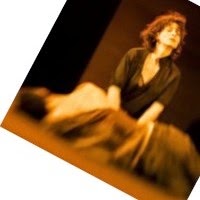Already celebrated internationally, Ivo van Hove became an instant superstar director in London as well last year, by stripping down Arthur Miller's A View From The Bridge until it was exposed as a Greek tragedy. So despite Juliette Binoche in the title role, a lot of the excitement about Antigone has come from the director returning to take on an actual Greek tragedy. A civil war between Antigone and Ismene's brothers has left them both dead, and their uncle Kreon (Patrick O'Kane) King of Thebes. Having somewhat unexpectedly got this new power, Kreon is keen to appear strong from the off, and decrees that while Eteokles, the brother who fought on his side, will have the traditional funeral rites, the rebel Polyneikes' body will be denied burial or mourning. This goes against every tenet of the gods, and while Ismene (Kirsty Bushell) and the townspeople are cowed by Kreon into following his demands, Antigone determines to bury her brother.
Sophokles' (as with the characters, the production spells his name with a K rather than the usual C to suggest the original Greek spelling*) play gets a translation by Anne Carson which I found pretty strong, a nice balance between lyricism and earthiness - the same quality that makes me a fan of Timberlake Wertenbaker's Greek translations.
Jan Versweyveld's wide, shallow set is dominated by a bright circle of light that becomes both sun and moon, the play bookended by eclipses. It's a modern-dress production with a sleek downstage area of desks, bookshelves and leather sofas where the Chorus of Elders (the main cast including, eventually, Binoche herself, double as the Chorus) spend most of their time; the main action takes place on a raised, carpeted platform that suggests the emptiness and hostile environment of the desert.
Although Antigone is the title role it's not really the central one; that's Kreon, and although I wasn't keen on the extent to which O'Kane dragged out his lines at the start, he does get better as the play goes on. Binoche is a fairly understated Antigone, not really the fierce political dissident she sometimes is. The production opens with a striking image of her walking into a wind machine, and that's representative of how she plays the role: The death rituals she performs on her brother's body are the duty she's been taught from an early age is compulsory, and she has no choice but to do them, even as she's buffeted by the winds of the king's unusual decree. In many ways the supporting performances are more interesting than the leads - they include Finbar Lynch as Teiresias and Obi Abili as the comic guard, while Samuel Edward-Cook is an unusually butch bit of casting for Haimon, Kreon's son and a character often cast as little more than a child.
This Antigone seems to have been something of a marmite production; for my part I liked it, although with some reservations, largely to do with the little flourishes to the staging: As with the odd design of the downstage area whose significance eluded me, Tal Yarden's video projections often seem to be at odds with what's going on in the play, and trying to decode their meaning is distracting. I ended up not trying to, simply ignoring them and concentrating on the action. Which is focused and involving, and it's interesting to see how van Hove uses some of the same techniques from his other production, but often to different effect.**
Antigone by Sophokles in a version by Anne Carson is booking until the 28th of March at the Barbican Theatre; then continuing on tour to Antwerp, Amsterdam, Paris, Recklinghausen, Edinburgh, New York, Chapel Hill NC, Ann Arbor Michigan and Washington DC.
Running time: 1 hour 45 minutes straight through.
*although if they really wanted to make the effort they'd have spelt it Sofokles
**Ian also wanted to point out a van Hove meme he'd spotted himself: He likes casting bald men.




No comments:
Post a Comment